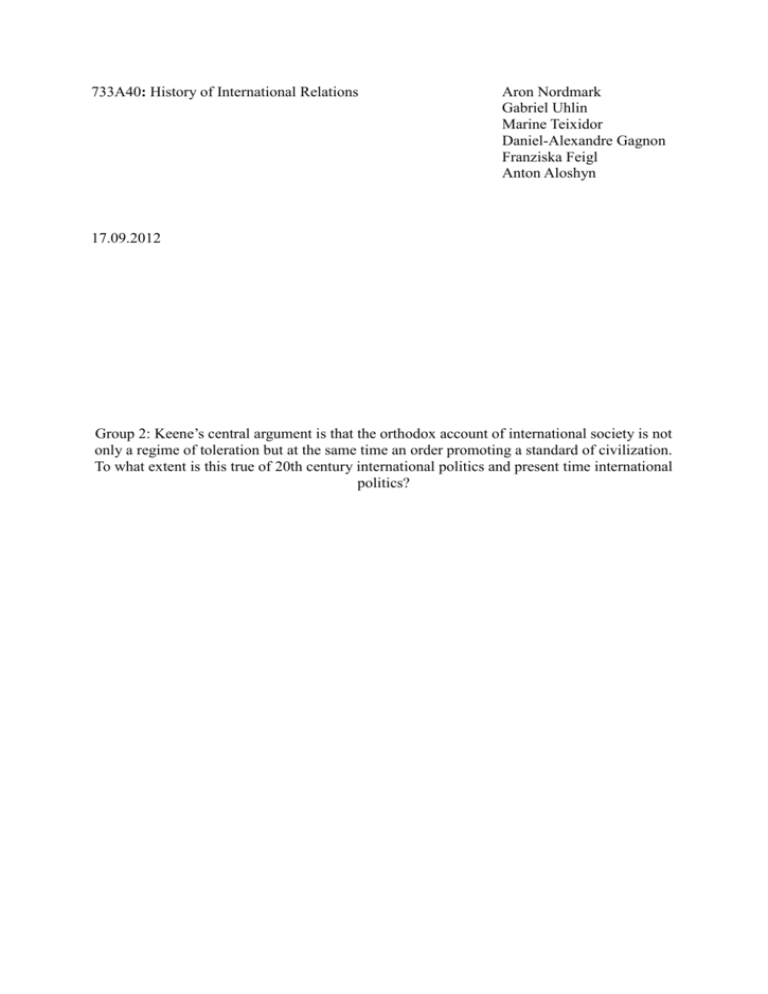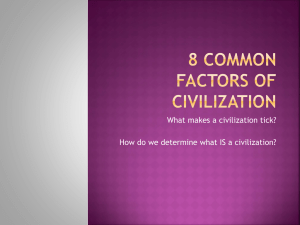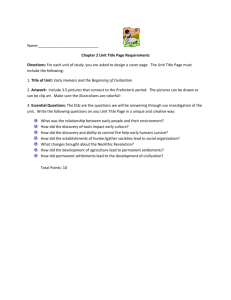733A40: History of International Relations Aron Nordmark Gabriel
advertisement

733A40: History of International Relations Aron Nordmark Gabriel Uhlin Marine Teixidor Daniel-Alexandre Gagnon Franziska Feigl Anton Aloshyn 17.09.2012 Group 2: Keene’s central argument is that the orthodox account of international society is not only a regime of toleration but at the same time an order promoting a standard of civilization. To what extent is this true of 20th century international politics and present time international politics? This paper addresses the question of how the two patterns of international order described by Edward Keene (toleration and civilization) have manifested themselves during the 20th and 21th centuries. By the end of the nineteenth and in the beginning of the twentieth century the international system was still to a large extent characterized by the notion of civilization that had dominated the international relations of the colonial era. The idea of a civilizational ideal had concretized into an actual standard of civilization which constituted the basis of the then International law. This standard included a number of more or less subjective criteria that states had to fulfill to be accepted as fully-fledged members of the international society. All the standards criteria embraced the liberal European values and norms which had deep roots in Latin Christendom. Nations that were not able to satisfy the criteria were not allowed to join the international club of fully sovereign civilized nations and did not receive full protection under international law.1 In the early years of the twentieth century the international society could be viewed as hierarchical consisting of two different spheres. The first smaller one was comprised of mostly European countries who regarded themselves as civilized with full sovereignty and protection under international law. The other sphere included the rest of the world’s nations who were considered backwards and uncivilized to some degree.2 In the wake of the First World War the hierarchical and discriminatory worldview as well as the notions of a certain superior civilization started to be questioned. The rise of communist and fascist ideologies coupled with the fact that several states that were considered civilized had fought each other during the war had challenged the belief of the superior European civilization to some extent. But these thoughts were still manifested in the aftermath of the Great War and it would take another world war between the so called civilized states of Europe before civilization as an instrument of discrimination between nations was discarded.3 The Second World War and its consequences shook the foundations of the international order to its core. Since the experience of the barbarity of fascism significantly weakened the European claim to represent a higher stage of civilization.4 An since, at the same time, the peoples of Africa and Asia, previously subjugated by European colonial powers now started demanding a right for national self-determination. The resulting world order obviously became more inclusive due to a very minimal standard of civilization ones described by Jack Donnelly as “Hobbesian conception of sovereignty”. According to this view, “the whole globe had been recognized as civilized”5 and thus the only thing required for membership in new international society was the control of a given territory with absolute right for non-interference in domestic affairs of states. De-facto, this meant the extending of international recognition even to some most repressive regimes. The UN Charter as the key document of the post-war international order makes no distinction between “civilized” and “non-civilized” nations while suggesting that the UN should strive to fulfill some of the classic goals of civilization. However, despite this duality, 1 Gong, Gerrit, The Standard of Civilization in International Society, 1984, 15. 2 Keene, Edward, Beyond the Anarchical society, 2002, 111. 3 Ibid, 121. 4 Ibid, 137-138 5 Donnelly, Jack. International affairs.1 1998. 13 the cold war – more or less – was a period of global toleration and minimal standards of civilization. The collapse of the USSR might seem as a confirmation of the genuine Westphalian nationstates system with respect and tolerance of territorial sovereignty. Indeed, since the cold war ended, both superpowers had allegedly reduced their willingness to maintain spheres of influence. Such stance of affairs might lead to belief that the Westphalian system had never been so strong before. Edward Keene, from his side, has brought a quite legitimate reflection concerning the dichotomous nature of the actual international relations system. Although Keene’s idea of a world orders promoting the certain standard of civilization can be criticized. In this respect, it is hard to avoid Fukuyama’s “End of History” as an empirical reflection of Keene’s idea meaning that the end of cold war is far from disappearance of global events or state interactions. On the contrary: the emergence of new concepts like “responsibility to protect” definitely points in that direction. Indeed, the responsibility to interfere in other state’s affairs in case of brutal violations of human rights corresponds in some ways to Keene’s assumption on actual international order where the certain standard of civilization could – or even should – be actively promoted. Quite recent international events like the Iraqi invasion of the USA primarily motivated by the will of turning the country into democracy clearly illustrated the recurrent passion of certain states to civilize the others. Finally, the standard of civilization could also be observed in membership conditions affirmed by some international and regional organizations like the WTO. While the adhesion to such institution is not mandatory, it is rather difficult not to be a member due to market economy as a globally dominating model. The same civilizing approach can be easily seen when it comes to European Union enlargement criteria. Even the territorial closeness of a state to Western Europe as EU’s heart doesn’t automatically guarantee the inclusion of the state in civilized European family. The Turkish aspiration for EU membership has been postponing regardless its official status as a candidate state while the former Yugoslavian countries are clearly seen as future EU memberstates. To conclude, we believe that the two patterns of international order described by Edward Keene have been present through the whole period of XIX-XX centuries, and do exist today. They have manifested themselves differently depending of certain historical events as the dominance of both toleration and civilization has swung back and forth. As we see, in modern globalizing world the civilized states mostly prefer using some sort of common standard developed by international community within world institutions. But unfortunately even this global solidarity is hardly perceived as a unique shield for any country unable to preserve its sovereignty against military invasions with assertively civilizing purposes.






